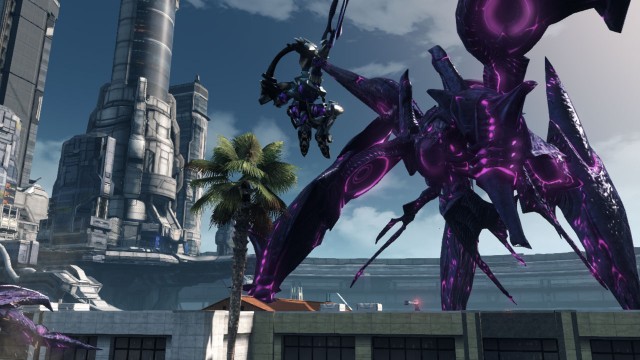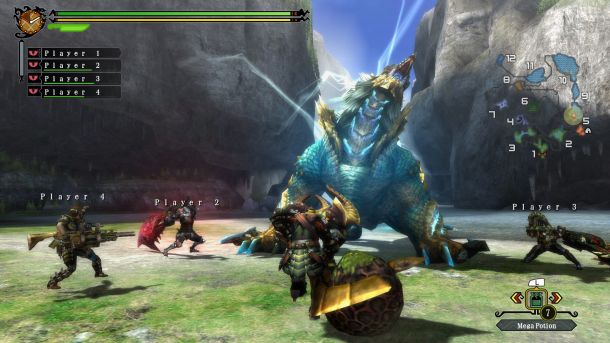
I think we’re at a pretty good point in the progression of multiplayer gaming. Developers have really hit their stride when it comes to the format, serving up a variety of experiences for almost any type of gamer. MMOs, first-person shooters, casual games, console experiences, PC, handheld, mobile … it’s all there. Indeed, the Internet has turned life itself into a multiplayer experience, thanks to the current constellation of robust social media networks.
Nintendo, as we all know, was on the forefront of the multiplayer movement but dragged its feet getting up to speed as the medium shifted. NES and SNES were early players in both co-op and competitive multiplayer, and Nintendo 64’s native support for four-player local multiplayer was a revelation. Yet the company struggled to grasp the realities of online multiplayer, with only tepid support on GameCube and an online architecture on Wii that, while technically existent, was more riddled with problems of hacks and exploits than its competitors. It was telling that the best Wii multiplayer games were the ones that didn’t use Wii servers. Trust me, I know; I reviewed piles of them for Nintendojo.
Multiplayer, while not universal, has become extremely pervasive in gaming, including in games that in the past would not have included it. I recently finished playing Mass Effect 3, which introduced competitive multiplayer for the first time in a series that had previously been resolutely single player. The highly anticipated Xenoblade Chronicles X, due out on Wii U in North America and Europe this December, is a multiplayer-enabled sequel to a single player game. That story-driven games like Mass Effect 3 and Xenoblade Chronicles X now feature multiplayer elements shows the shift that developers have taken. I’m not sure this as of yet constitutes a full-on convergence between traditional single-player franchises and MMO sensibilities, but if the recently released Elder Scrolls Online is any indication, that future might not be too far off.

It is my hope, though, that developers continue to maintain a heart for quality, story-driven, single player adventures. For one thing, multiplayer components to predominantly single player games always make me a little nervous. Developers have finite resources, and devoting even a portion of those resources to multiplayer potentially comes at the expense of something else. That doesn’t mean that a good single-player game is necessarily compromised by shifting resources to multiplayer, but it is a risk. We’ll never know what could have been added to such a game were the resources allocated in a different way, especially if the multiplayer turns out to be broken or less-than-polished, which it sometimes is.
For those who desire competition, competitive multiplayer (PvP) is really superior to what an AI opponent could reasonably do, and I would say that competitive games are an area where online multiplayer in particular can really shine. Cooperative multiplayer (PvE) also has its upside in that a competent human player will usually outperform (and be less aggravating) than most AI-controlled characters. I remain especially fond of local co-op multiplayer with friends, going back to the olden days of fighting through the impossible world of Gauntlet.
For online cooperative endeavors, however, there are trade-offs that are not always the greatest. For that reason I’ve personally found cooperative multiplayer experiences, including deep MMORPGs, to be a mixed bag. One trade-off, for example, comes in the immersiveness of the game. In a single player experience the NPCs operate in character; everyone talks and behaves like they are part of the world, because they are. When I galavant around the Skyrim of The Elder Scrolls V or the Bionis of Xenoblade Chronicles, every character fits the world.
When you bring multiplayer online into the mix, that sociology changes in subtle ways. Online players rarely talk or operate in character, per say; instead they speak and type in a particular shorthand. This is often necessary in a game where there isn’t often time to spell out things in long, drawn-out ways, especially in the heat of battle, but the end result is that the game never feels entirely like you’re in a fantasy world or a pitched historical battle. Instead, it feels like you’re in a virtual simulation of one of those things. Contrast that with groups who get together for paper-and-pencil RPGs, where contributors, from the gamemaster down, are more likely to speak in the language of the game world.

There is also the tone in which people in online co-op speak to one another. In a traditional single player game, interactions with NPCs run the gamut from friendly to hostile, and while the storylines can be moving– few will emerge from Final Fantasy VII without strong opinions of Sephiroth– there is never personal offense taken, since the player knows it is a story, not real. In a multiplayer game, real people are involved, and those real people can be supportive and they can be awful. I’ve experienced both. I’ve participated on a high-level team where criticisms were gentle and constructive, and where there was a real esprit de corps about the stated goal. I’ve also been insulted, berated, and cursed at by people, often for completely ridiculous reasons. Real life often forces us to have thick skin, but video games are meant to be a respite from the demands of life and it’s nice to have a place where one doesn’t have to brace themselves against such things. When other players subvert that, it undermines the whole enjoyment of the game.
Online multiplayer still has an important place, both in PvE and PvP, and I think it is a valuable element within the gaming world. I also think that there is something powerful about a good old-fashioned single player tale where the player is not just a reader of a book, but a participant in a vibrant, immersive story. Those adventures never grow old for me.




 ShareThis
ShareThis







Good article on the pluses and minuses of both camps. Personally I prefer single player, story driven games only. I don’t utilize multiplayer at all currently, and really don’t care for it. I’ve noticed the last few years the shift towards online only games with no single player campaign at all, and I find that immensely troubling. There should ALWAYS be a single player campaign and one that doesn’t require a purchase of an online service to use. Titanfall was a perfect example of this, I was looking forward to it until I found I had to pay to play. Same with Destiny and Star Wars Battlefront. Also, these games have a limited life, if they discontinue the online service. Bad move, should always include a single player element along with those who enjoy the online play.